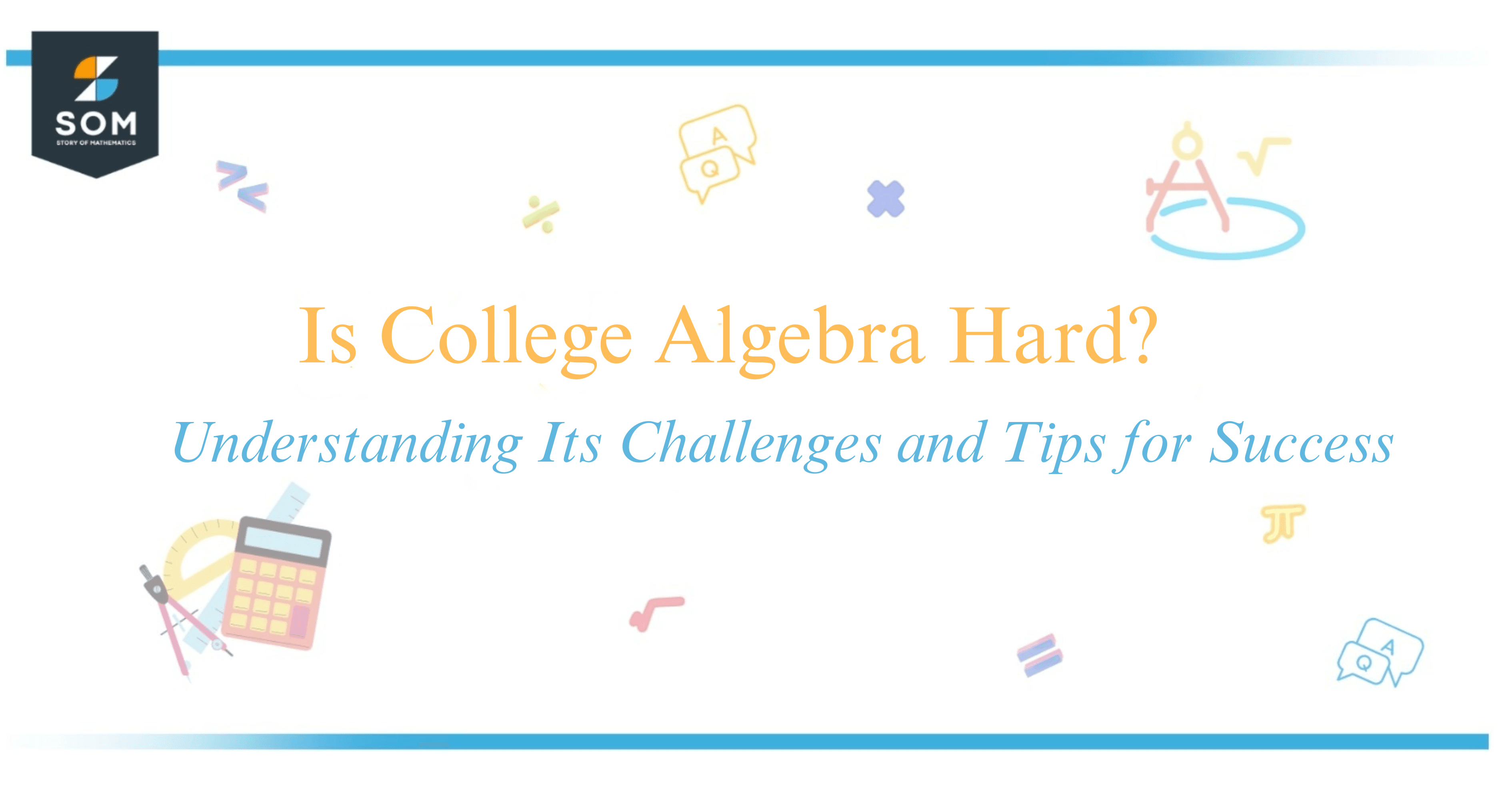 No, college algebra is not inherently difficult, though it can present challenges to some students. The course serves as a crucial foundation for advanced mathematics and many science degrees, requiring an understanding of essential algebraic concepts. With adequate preparation and a dedication to practice, students generally can overcome the hurdles it poses.
No, college algebra is not inherently difficult, though it can present challenges to some students. The course serves as a crucial foundation for advanced mathematics and many science degrees, requiring an understanding of essential algebraic concepts. With adequate preparation and a dedication to practice, students generally can overcome the hurdles it poses.
For those who excelled in high school algebra, the transition to college algebra may be smoother, though a change in teaching style or course intensity often requires some adjustment.

I find that success in college algebra often comes down to confidence and consistent effort. Engagement in the classroom, a regular study routine, and seeking help when necessary can make a significant difference. Recognizing and addressing one’s weaknesses early on is particularly important since the course tends to build on concepts progressively.
In my experience, being curious and asking questions goes a long way in unraveling the abstract concepts that often make college algebra seem daunting. Are you ready to discover how to tackle college algebra effectively? Let’s explore this together.
Understanding College Algebra
College algebra serves as an essential branch in the mathematics tree, focusing deeply on various functions and their properties. When I approach college algebra, I recognize it’s fundamentally a continuation of the concepts I might have learned in high school.

The course typically covers a broad spectrum of topics, from basic numbers and operations to more complex areas like quadratic equations and inequalities.
Here’s a snapshot of the key areas that my college algebra course will cover:
Numbers and Operations: Fundamental to all mathematics, this includes working with integers, fractions, and real numbers.
Equations and Inequalities: Equalities such as $ax^2 + bx + c = 0$ for quadratic equations are studied alongside various forms of inequalities.
Functions: I explore different types of functions, their uses, and how to graph them.
Systems of Equations: This includes methods to solve multiple equations with multiple unknowns, usually involving either substitution or elimination techniques.
Expressions and Properties: Understanding how to manipulate algebraic expressions using properties of arithmetic is crucial.
The Linear Equations: The form $y = mx + b$ is familiar, as this represents a straight line graphically.
Polynomials and Exponents: I work with expressions involving variables raised to powers, and polynomials of various degrees.
| Mathematical Concept | Example Equation | Application |
|---|---|---|
| Quadratic Equations | $ax^2 + bx + c = 0$ | Determining projectile paths |
| Linear Equations | $y = mx + b$ | Calculating constant rates |
| Polynomials | $4x^3 – 3x^2 + 2x – 1$ | Modelling physically real contexts |
To become proficient, consistent practice is indispensable for strengthening my understanding of these concepts. By practicing solving equations and performing operations regularly, I can make steady progress and potentially find the course manageable and rewarding.
Strategies for Success
When I tackle college algebra, I start by getting familiar with the syllabus and marking important dates in my planner. Due to the cumulative nature of math, consistent effort in attending every class time and completing assignments is crucial. I make it a point to approach my professor after class or during office hours for any clarifications I need.
Math concepts like whole numbers, real numbers, logarithms, matrices, and radicals can be daunting, but using a graphing calculator effectively simplifies the process. Especially when dealing with inverse functions or completing the square, a graphing calculator can be a lifesaver. Here’s the importance of a calculator in solving an equation involving absolute value: $$ |x – 4| = 2 $$
| Without Calculator | With Graphing Calculator |
|---|---|
| Solve two separate equations | Input directly and observe the graph for solutions |
| ( x – 4 = 2 ) and ( x – 4 = -2 ) | Confirm results instantly |
I maintain meticulous notes and review them regularly to reinforce formulas and procedures for dividing polynomials or graphing functions. Joining or forming study groups allows me to gain from diverse perspectives and learning styles, which is particularly helpful for challenging topics like intermediate algebra.
Proper preparation for quizzes and exams includes practicing with online help and study guides, which offer structured study techniques. I find that tackling a range of problems, from graphs to statistics applications, builds confidence and ensures I am ready to pass.
Homework doesn’t just help me practice but deepens my understanding of the range of topics prevalent in fields like business, science, and engineering. I realize that college algebra serves as a foundation for these subjects, so mastering it opens doors to various academic and professional pathways.
Engaging actively with the material and utilizing resources like my calculator, online help, and study guides invariably set the scene for a successful journey through college algebra.
Conclusion
In my experience, the difficulty of college algebra can vary widely from one student to another. My success hinged upon a well-structured study approach and consistent practice.
The course indeed covers a broad range of topics, including complex equations and abstract concepts, which can be intimidating at first glance.
Key strategies that helped me:
- Regular Attendance: I made it a point to attend every class. This kept me from falling behind and allowed me to stay engaged with the material.
- Seeking Assistance: Whenever I encountered challenges, I reached out for help. This could mean tutoring sessions, study groups, or office hours with the professor.
- Practice, Practice, Practice: I dedicated time each day to work through problems. Regular practice reinforced my understanding of concepts like solving for $x$ in the equation $ax^2+bx+c=0$.
I also leveraged resources beyond the classroom, such as online tutorials and problem-solving forums. These platforms offered alternative explanations that sometimes resonated better with my learning style.
Ultimately, my approach to college algebra was methodical and involved a lot of hard work. The sense of achievement I felt when mastering a particularly challenging topic was always worth the effort. I believe that with the right support and commitment, college algebra is manageable for most students.
